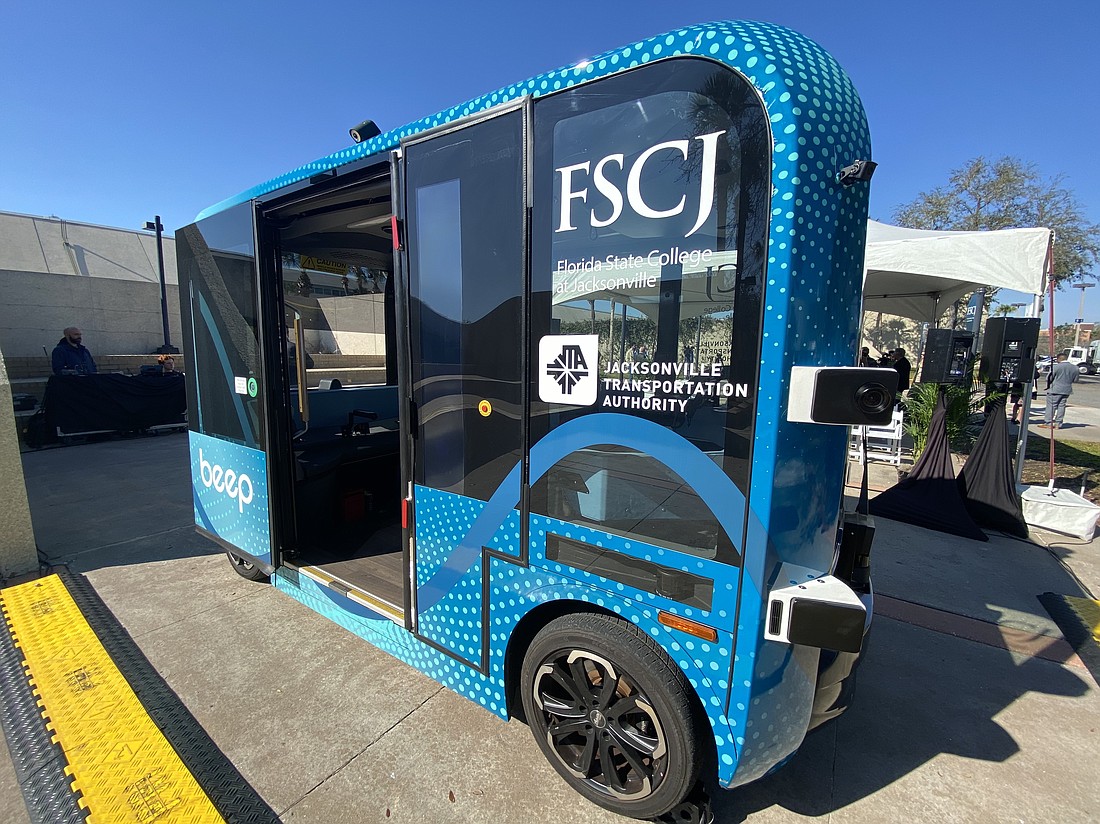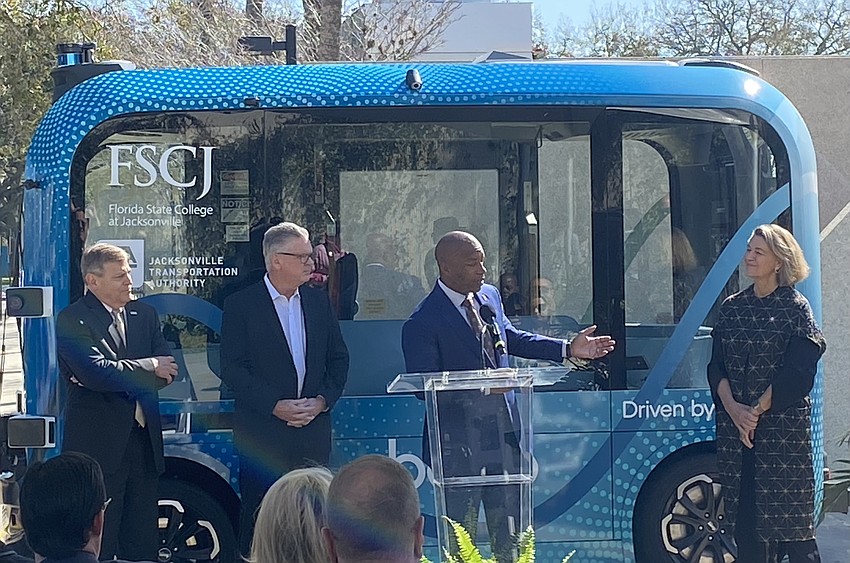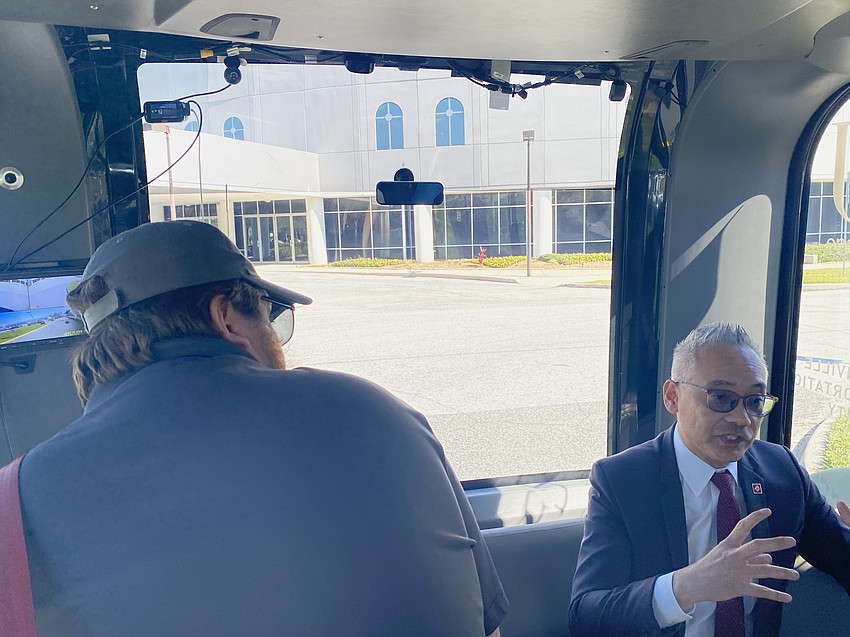
Students and faculty at the Florida State College at Jacksonville Downtown campus have a new high-tech way to circulate from class to class.
On Feb. 20, the school became the first college campus in Florida to offer autonomous vehicle shuttle service.
In a partnership between the school, the Jacksonville Transportation Authority and AV manufacturer Beep, two shuttles will operate on a fixed route in a five-month pilot program.
“A change is coming to public transportation in our country, and that change is starting here in Jacksonville, Florida,” JTA CEO Nat Ford said.
“Ten years from now we will see people hopping on and off autonomous vehicles, and it’ll be pretty commonplace at that time. And I think we could look back and be very proud of what we’re doing today.”
The electric-powered shuttles use a system of cameras, radar and Light Detection and Ranging, called LIDAR, technology to sense oncoming traffic and pedestrians.

During the trial period, the vehicles will be manned by onboard “safety operators” whose role is to take over the controls if the shuttles fail to recognize a potentially dangerous situation.
The cost of the trial is $322,000 including equipment and salaries for the onboard attendants. JTA is paying for the program.
The shuttles will operate during daytime hours with two stops: at the administrative offices building on the west side of the campus and at the classroom buildings and student support facilities across Pearl Street to the east. The route is about 1 mile round-trip.
The campus boundaries are State, Main, First and Jefferson streets.
During a test ride after a news conference, four reporters and a JTA administrator fit comfortably in the seating area. The safety operator said the vehicle was in automated mode throughout the ride, which took 10-15 minutes.
Ford said the pilot program would help the JTA prepare for its Ultimate Urban Circulator program, known as the U2C. That program, which is scheduled to launch in 2025 on a 3.2-mile stretch designated the Bay Street Innovation Corridor, will feature public autonomous shuttles running from Pearl Street to EverBank Stadium.
Future phases of the U2C are designed to repurpose the Skyway structure as an elevated roadway for unmanned vehicles with ramps to allow the vehicles to access city streets.
The finished U2C system would be a 10-mile vehicle network.

The total cost of the system is estimated at $379 million to $400 million. The Jacksonville City Council approved a gas tax increase in 2021 that funds $247 million of the project.
FSCJ President John Avendano said the pilot program complements the school’s programs for autonomous vehicle testing and EV battery technology, for which FSCJ received grants from the National Science Foundation to develop curriculum.
“It’s the future, and it’s here,” he said after he and other leaders rode into the news conference on one of the shuttles.
Avendano said the shuttle service would improve mobility for students on campus and was being considered for FSCJ’s South and North campuses.
“This makes great sense for us because of our expansive service area and the many students who walk to and from our campuses and utilize public transportation on a daily basis to our various four campuses and three centers and two academies,” he said.
”So it is our responsibility to support our neighbors across the service area in any way that we can.”
During the news conference, reporters asked about safety issues involving autonomous vehicles, including reports of accidents and of vehicles blocking emergency equipment.
Beep CEO Joe Moye called the shuttles a “walk-before-you-run technology” compared with automated taxis that operate on open routes.
“This is a very different business model,” he said.
“This is about shared mobility working in controlled, geofenced environments where you have a fixed route. So the vehicles know exactly where they’re operating at any point in time, and they’re able to navigate much more safely and predictably.”
Responding to another question, Moye said the vehicles would not operate during inclement weather. Just as rain and fog can make it difficult for human drivers to see what’s around them, those conditions can affect autonomous vehicles’ sensing technology.
“We do not drive these today in the typical sideways 4 p.m. rainstorm, to be candid,” he said.
“But I will say with the advent of the radar technologies and the fusion of all of those sensors, they’re becoming more and more humanlike in their ability to deal with the elements. But in the rain storms that come every afternoon or every other afternoon, we’ll park the vehicles, wait for the storms to pass and then get back into service.”
Debbie Buckland, JTA board chair, said the development of FSCJ’s shuttle system and the U2C would generate jobs and create a more mobile, connected community.
“We’re going to be famous for this,” she said.